In the Sahel, weak law enforcement capacities, vast ungoverned territories, and underdeveloped criminal justice systems have contributed to the proliferation of nonstate armed groups, with the military placed at the forefront of suppression efforts. A number of issues arise in the adjudication of terrorism cases. Ambiguities in the law persist where the protective framework of minors conflict with repressive antiterrorism framework; understaffed courts are burdened by a large caseload, while individuals detained en masse face criminal sanctions that may not always be proportional to the gravity of the offense. Judicial investigations are further hampered by a lack of cooperation with military actors and coordinated efforts to preserve evidence on the battlefield.
To affirm the primacy of the criminal justice framework, the chief justices of the Sahel supreme courts unanimously adopted a set of recommendations on 2 March 2018 in Dakar, Senegal. This report presents the legal responses to terrorism in Burkina Faso, Chad, Mali, Mauritania, Niger, and Senegal and discusses international standards articulated in the field, providing comparative analysis and commentary. It features contributions from supreme court justices from France, Niger, Mali and Senegal. The report forms part of a program on Counter-Terrorism Criminal Justice Support to Senior Judicial Officials shaped by a steering committee comprised of supreme court justices and implemented in partnership with UN Counter-Terrorism Committee Executive Directorate, the UN Office on Drugs and Crime, and the Association of Francophone Supreme Courts, and funded by the International Organisation of la Francophonie and the governments of Canada and Japan.
___________________________________________
Quand la poussière retombe: La justice face au terrorisme dans le Sahel
Dans le Sahel, les faibles capacités de la police et la présence limitée des autorités dans les territoires reculés contribuent à l’inefficacité de la justice, et les militaires ont joué le rôle de premiers intervenants. Un certain nombre d’enjeux se posent dans la gestion des affaires de terrorisme. Les ambiguïtés de la loi persistent là où la protection spéciale accordée aux mineurs entre en conflit avec le cadre antiterroriste ; les cours, déjà surchargées, sont confrontés à un nombre croissant de dossiers de terrorisme et les accusés font l’objet de sanctions pénales qui ne sont pas toujours proportionnelles à la gravité du délit ou crime. Au niveau de l’enquête, les magistrats ont déploré la piètre qualité de la gestion des éléments de preuve par les premiers intervenants sur le champ de bataille.
Affirmant la primauté du cadre de justice pénale, les premiers présidents des cours suprêmes des pays du Sahel ont adopté à l’unanimité des recommandations dans la matière le 2 mars 2018 à Dakar, au Sénégal. Ce rapport présente les réponses judiciaires au terrorisme au Burkina Faso, au Mali, en Mauritanie, au Niger, au Sénégal, et au Tchad, et évoque des normes internationales développées dans la matière tout en fournissant une analyse et des commentaires comparatifs. Le rapport présente des contributions de magistrats des cours suprême de la France, du Niger, du Mali et du Sénégal, comprenant des membres d’un comité de pilotage dans le programme sur « Les cours suprêmes dans la prévention et la lutte contre le terrorisme ». Ce projet a été réalisé avec l’appui et l’expertise de la Direction exécutive du Comité contre le terrorisme, de l’Office des Nations Unies contre la drogue et le crime (ONUDC), de l’Association des Hautes Juridictions de Cassation des pays ayant en partage l’usage du français (AHJUCAF), et a bénéficié du soutien financier de l’Organisation internationale de la Francophonie (OIF) et des gouvernements canadien et japonais.
